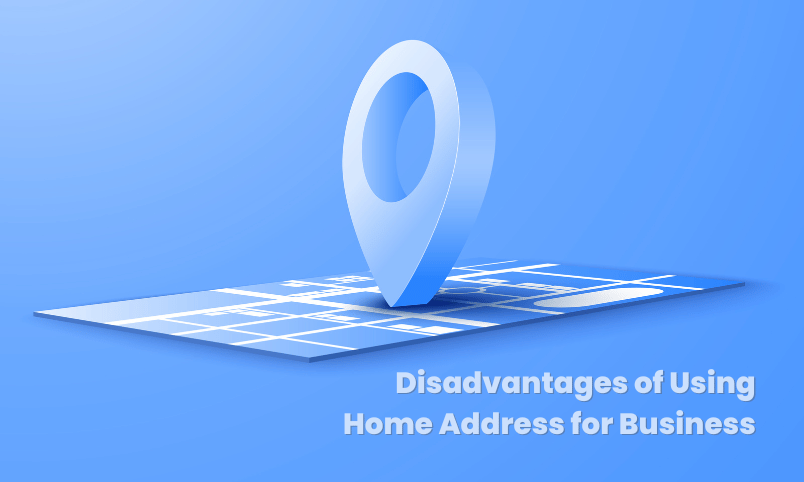By Esabda
Picture this: You’re cozily nestled in the comfort of your home, sipping on a cup of steaming coffee while juggling business calls and emails. Sounds like a dream come true, right? Well, hold on tight because we’re about to reveal some eye-opening truths! In this article, we’ll uncover the disadvantages of using your home address for business.
Brace yourself for a rollercoaster ride through the potential pitfalls and drawbacks that might just change your perspective. So, grab another sip of that coffee, and let’s dive headfirst into the wild world of why using your home address for business might not be your best bet.
Disadvantages of Using Home Address
There are various disadvantages that come with the use of home address in the business. Some of the major disadvantages that might also effect your business are explained below:
1. Lack of Professionalism
Mixing Personal and Professional Life
One significant disadvantage of using your home address for business is the blurred boundary between your personal and professional life. By intertwining the two, it becomes challenging to maintain a clear distinction, which can lead to confusion and potential complications. Clients may find it unprofessional if they need to visit your home to discuss business matters or if they encounter personal items during professional interactions.
Perception of Unreliability
Additionally, using a home address for your business can create an impression of unreliability. Clients and partners might question the seriousness and commitment of a business that operates from a residential address. It may suggest a lack of stability, resources, or long-term vision, which can deter potential customers and hinder the growth of your enterprise.
2. Privacy Concerns
Unsolicited Marketing and Sales Calls
When your home address is publicly associated with your business, you become vulnerable to unsolicited marketing and sales calls. Listing your address on marketing materials or online directories exposes you to a higher risk of receiving unwanted communications. Dealing with these interruptions can be time-consuming and divert your attention away from core business activities.
Safety and Security
Another crucial factor to consider is the safety and security of your home. Displaying your home address publicly exposes you, your family, and your property to potential risks. Even though not everyone is evil, it’s still necessary to safeguard your loved ones’ safety and privacy by keeping your home address separate from your professional concerns.
3. Limited Scalability
Geographic Constraints
Using a home address can impose geographic constraints on your business. If you plan to expand or target customers outside of your local area, having a residential address may not convey the same level of trust or professionalism. It can deter potential clients who prefer dealing with businesses operating from dedicated commercial premises.
Difficulty Expanding Operations
Expanding operations can be challenging when using a home address for business. Hiring employees, establishing a physical presence in new locations, or partnering with other businesses may require a commercial address. Lack of a professional business location can limit your ability to scale and seize growth opportunities.
4. Legal and Compliance Issues
Violation of Zoning Laws
Operating a business from a residential address may violate local zoning laws and regulations. By limiting some activities to specific zones, zoning regulations help maintain the harmony between residential and commercial regions. Using your home as a business address without proper permits or approvals can result in legal consequences and potential fines.
Regulatory Requirements
You might need to comply with specific regulatory standards depending on the nature of your business.
These requirements often include obtaining licenses, permits, or certifications. However, some regulatory bodies may not allow businesses to operate from residential addresses. Penalties and disruptions to your business operations may result from not adhering to these regulations.
5. Difficulty Establishing Business Credit
Impact on Credit Score
Using a home address for business can have an adverse effect on your ability to establish and build business credit. Lenders and financial institutions typically prefer businesses with a separate commercial address as it signifies a higher level of professionalism and stability. When your business and personal address are the same, it becomes challenging to separate your personal and business finances, potentially impacting your creditworthiness.
Limited Access to Business Financing
Securing business financing can be more challenging when using a home address. Many lenders require a commercial address as part of their application process. Without a dedicated business location, you may face difficulties accessing loans, lines of credit, or business grants. This limitation can hinder your ability to invest in growth initiatives or address financial emergencies.
6. Lack of Professional Image and Branding
Inconsistent Branding
Using a home address can lead to inconsistent branding and messaging. Your business’s image and brand may be compromised if it is associated with a residential address. Clients and customers might find it difficult to perceive your business as a professional entity, leading to a lack of trust and diminished brand value. Inconsistent branding can hinder your marketing efforts and limit your business’s potential for success.
Difficulty Establishing Credibility
Credibility is crucial for any business, particularly when building relationships with clients, partners, and suppliers. Operating from a residential address can create skepticism and doubt about your business’s credibility and legitimacy. Establishing trust becomes more challenging when potential stakeholders perceive your business as less established or less professional due to the choice of address.
7. Difficulty Scaling Online Presence
SEO Challenges
When it comes to online visibility, using a home address can present SEO challenges. Local search engine optimization relies on consistency and accuracy of business information across various platforms. With a residential address, you may struggle to rank higher in local search results, limiting your online visibility and potential customer reach.
Inadequate Online Directory Listings
Many online directories categorize businesses based on their address. When using a home address, you may not be eligible for inclusion in certain directories or industry-specific listings that are exclusive to commercial addresses. This exclusion can result in missed opportunities to reach your target audience and gain exposure to potential customers.
Conclusion
While using a home address for business may offer convenience and cost savings initially, it’s essential to consider the long-term disadvantages. The lack of professionalism, privacy concerns, limited scalability, legal and compliance issues, difficulty establishing business credit, a compromised professional image, and challenges in scaling online presence are all factors that can hinder the growth and success of your business.
It’s crucial to weigh these drawbacks against the advantages and consider alternatives, such as renting a commercial space or utilizing virtual office services, to overcome these disadvantages and position your business for long-term success.
Also Read:
- How To Find Angel Investors For Small Business | 10 Ways
- How to Reduce Small Business Health Insurance Costs in 2023?
Frequently Asked Questions (FAQs)
Yes, using a P.O. Box can provide a level of privacy and professionalism for your business. However, it’s important to note that some online directories and lenders may require a physical address for certain purposes, such as verification or eligibility.
Using a home address for business without proper permits or approvals can result in violations of zoning laws and regulations. This can lead to legal consequences, such as fines or even being forced to cease operations. It’s crucial to consult with local authorities and ensure compliance with applicable laws and regulations.




